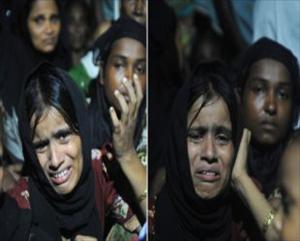(Ahlul Bayt News Agency) - In an article on Vice.com, Assed Baig writes about the evidence he gathered in Myanmar regarding the sexual abuse inflicted in captive Muslim Arakanese women and young girls by the Myanmar army.
Baig explains that when his contacts told him about Arakanese women being kept against their will at a military base while he was staying at Sittwe, the main city in Arakhan state, he tracked down some of the eyewitnesses.
These eyewitnesses provided Baig with access to the camps despite risking their lives in doing so, since the Arakanese Muslims are not recognized as citizens of Burma, meaning they have no rights and very little access to education and healthcare.
Baig revealed that he obtained evidence that strongly implies that the Burmese military is imprisoning Muslim women from the Arakhan region and using them as sex slaves. The evidence has been delivered to the International Labour Organisation (ILO), a United Nations agency, which has lodged a complaint to the Burmese government and launched an investigation in an attempt to rescue the women.
Eyewitness testimony stated that around 20 women and three children under the age of eight are being held at the camp.
Baig describes an eyewitness he refers to as Amina, who heard voices calling out to her as she passed the camp. The imprisoned women asked Amina if she was Muslim, then pleaded for help.
The women told Amina they were being raped and asked her to pass the message on to someone who could help. “Our parents can't find us,” they added.
The women were only able to speak with Amina since the soldiers were away for Myanmar’s Independence Day
The captive women told Amina that if the word about them spread too much, the military would kill them. They also warned her that she was at risk of being killed herself.
Amina saw three children inside the camp. She said the women were crying and referred to her as their daughter and sister. Some of the women were clearly pregnant.
Baig writes that information from various sources indicates that local villagers are aware that women are being kept as prisoners but are too scared to speak out. The Arakanese are not recognised as citizens of Myanmar, therefore the punishment inflicted on them would not go through official judicial channels.
Another eyewitness mentioned another camp 20 minutes away, where another woman was apparently being held under similar conditions. He and around 14 rice-paddy workers went to speak with the women and asked her what she was doing at a military camp if she was Muslim. She replied, “I have two children,” implying that her children are being used to keep her imprisoned at the camp.
Baig conveyed that eyewitnesses were mostly too afraid to speak since the Arakanese have no rights or official form of protection and thereby risk their lives by speaking with journalists.
The last known sighting of the captive women at the camp was at the end of March.
End item/ 149

